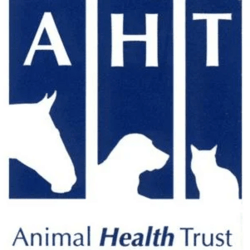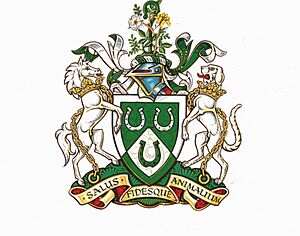Animal Health Trust facts for kids
 |
|
| Founded | 1942 |
|---|---|
| Founder | WR Wooldridge CBE, FRCVS |
| Dissolved | 31 July 2020 |
| Type | Charitable organisation |
| Focus | |
| Location |
|
| Origins | Veterinary Education Trust by Walter Reginald Wooldridge |
|
Area served
|
Veterinary medicine |
|
Key people
|
|
The Animal Health Trust (AHT) was a big charity in the United Kingdom. It had about 200 scientists, vets, and support staff. Their main goal was to study and find cures for diseases in pets like horses, dogs, and cats. They also did research and offered advanced training in animal medicine.
The AHT was started in 1942 by WR Wooldridge. In 1963, it received a special honour called a Royal Charter. Queen Elizabeth II was the charity's patron for many years. The Princess Royal was also its president. The AHT was based in Newmarket and did not get money from the government. Sadly, the charity closed down on July 31, 2020. This happened because of money problems, which got worse during the COVID-19 pandemic.
Contents
What the AHT Did
The Animal Health Trust focused its research on two main types of diseases. These were diseases that animals are born with (inherited diseases) and diseases that can spread (infectious diseases).
Studying Inherited Diseases
Research into inherited diseases included several areas:
- Genetics: This is the study of how traits and diseases are passed down through families.
- Oncology: This is the study and treatment of cancer in animals.
- Stem Cell Research: This involves using special cells that can develop into different types of cells to help heal or treat diseases.
Fighting Infectious Diseases
The AHT also worked on infectious diseases. This included:
- Bacteriology: Studying bacteria that cause illness.
- Virology: Studying viruses that cause illness.
- Immunology: Learning how an animal's body fights off diseases.
- Equine Epidemiology: Studying how diseases spread among horses.
- Disease Surveillance: Keeping a close watch on animal diseases to prevent outbreaks.
The AHT had clinics that trained new vets. They also published their findings in science journals. They even had their own library where people could read their research.
Animal Study Centres
The AHT had two main centres for treating animals and doing research:
- The Centre for Small Animal Studies, for pets like dogs and cats.
- The Centre for Equine Studies, for horses.
Both centres had labs for testing and services for DNA testing. They used these to help diagnose and research animal health problems.
History of the AHT
The Animal Health Trust began in 1942. It was first called the Veterinary Education Trust. Walter Reginald Wooldridge was its founder. In 1948, its name changed to the "Animal Health Trust."
Early Days and Growth
One of the first big supporters was Annie Henrietta Yule. She let the Trust use her stable in Newmarket. The Trust worked from there until 1998. The AHT grew quickly after 1942. It started programs for vets to get more training. It also set up four research centres. These centres helped diagnose, treat, and prevent diseases in many animals. This included horses, dogs, farm animals, and chickens. The AHT made a huge difference in animal science.
After Wooldridge passed away in 1966, the Trust focused more on horses and small animals. In 1998, all its work moved to Lanwades Park near Newmarket.
Special Recognition
In 1989, the Trust received a special grant of arms. This is like a unique symbol or crest. Its motto was "Salus Fidesque Animalium." This means "the health and trust of animals."
Lord Kirkham was a very important supporter of the AHT. He was on the Board of Trustees for 30 years. He also gave a lot of money to the charity. In 1996, he was made a knight for his charity work, including for the AHT.
The Closure of AHT
The Animal Health Trust faced money problems. These issues became much worse because of the COVID-19 pandemic. Because of this, the charity had to close down on July 31, 2020. After it closed, there was an auction in August 2020 to sell its medical equipment. The AHT's medical site was also put up for sale.
Lord Kirkham helped move the Harris Library to the Harper Keele Veterinary School. He also helped transfer the Trust's old records to the Royal College of Veterinary Surgeons.


